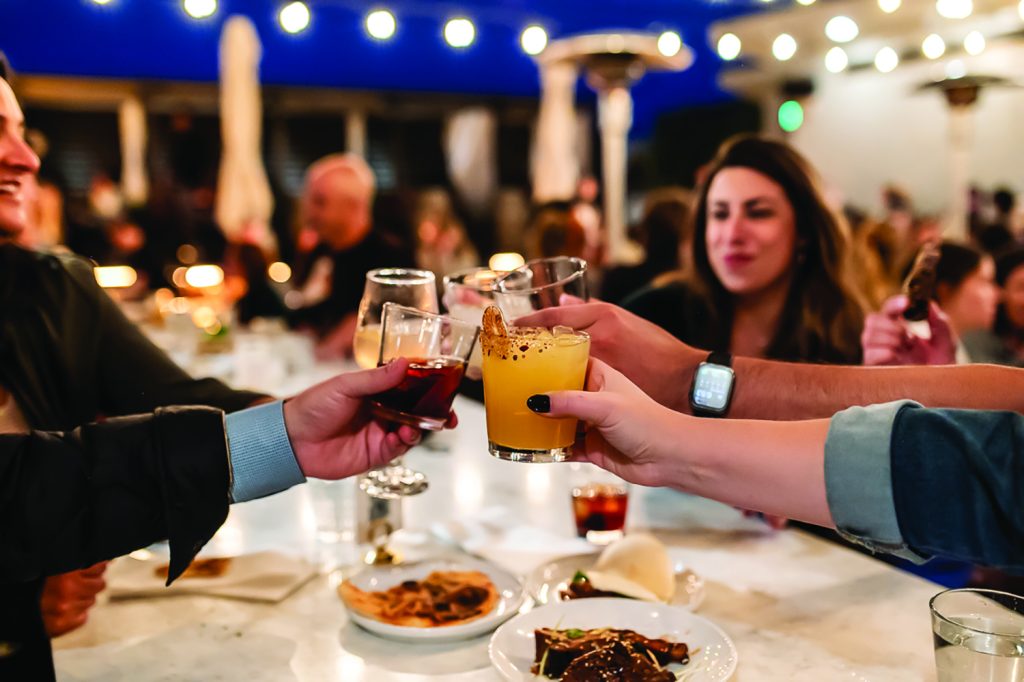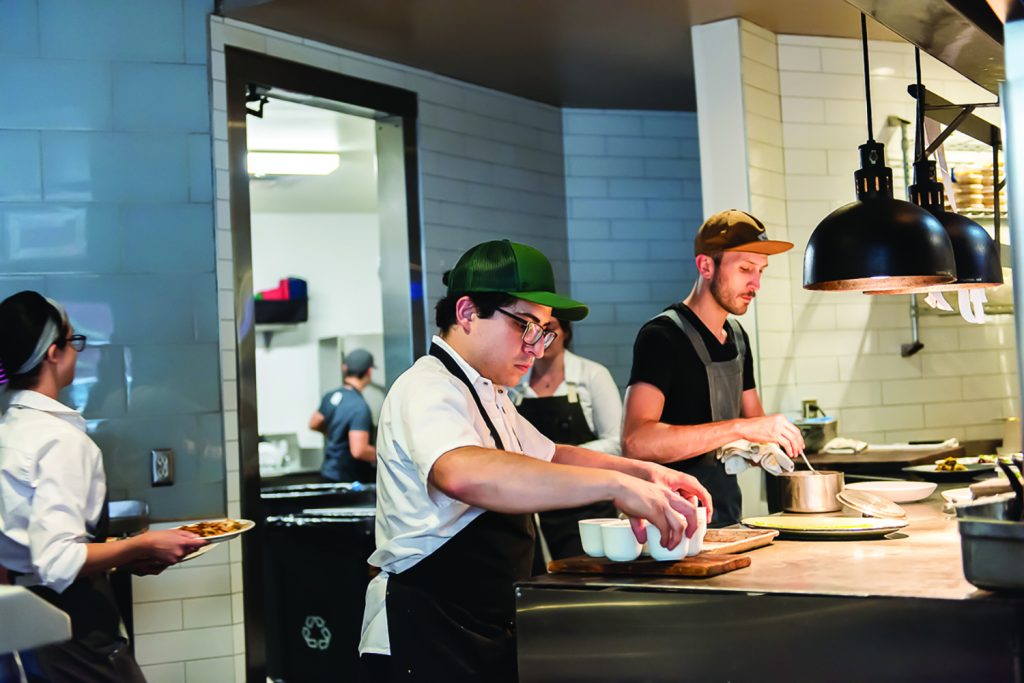
With new eateries opening, bistros earning Michelin awards and the Coach Prime effect bringing in visitors, you might assume that 2024 is the best of times for Boulder’s dining scene. But this hopeful veneer disguises a harsh truth: Boulder restaurants are struggling.
The most painful symptom of that extreme stress is the cancellation of First Bite, Boulder’s celebrated dining week, along with First Sip, its sister beverage program.
“The events are not on hiatus,” says Jessica Benjamin, owner of Boulder-based Savor Productions, which presented the twin events. “We will not do First Bite or First Sip again.”
First Bite debuted in 2005 offering a week of multi-course meals at Boulder restaurants designed to fill seats and introduce diners to new destinations. Benjamin purchased the event in 2019 and launched First Sip in 2022. Some 10,000 diners participated in recent years.
“What I noticed post-pandemic was that the passion from the restaurants and diners for First Bite wasn’t the same, but I couldn’t quite put my finger on it,” Benjamin says. “Last fall, we thought things were improving with the increase in tourism. We offered the restaurants a lot of options for participating in First Bite. The restaurants who were joining First Bite were super enthusiastic, but ultimately we had fewer restaurants and fewer diners.”
Canceling this year’s First Bite started out as a joke among her staff, Benjamin says. But then “we started wondering why we were doing it. No restaurants were calling wondering when the event was happening. We heard from diners that they weren’t interested in — and couldn’t afford – something extravagant or new.”
One reason for First Bite’s demise is burnout on the part of the restaurants and Benjamin’s company that employs six Boulder moms.
“We could kill ourselves working 80 hours a week doing this,” she says. “The reality is that our kids need to be prioritized over throwing an event for fun, an event that isn’t needed or wanted.”

Courtesy: Branded Beet PR
Canceling the events came with repercussions beyond disappointment. Benjamin had to lay off a staff member, something she calls “a hard choice.”
Dedicated “restaurant weeks” are still popular across the nation, including events in Seattle, Cincinnati and elsewhere in the coming weeks. Denver Restaurant Week recently celebrated its 20th anniversary with meals offered at hundreds of local eateries, including several in Boulder County.
There is one glaring difference, according to Benjamin: First Bite was one of the handful of privately owned restaurant weeks in the U.S.
“Denver Restaurant Week is owned by Visit Denver,” she says. “They have infinite sales tax dollars and access to corporate support. Savor Productions is not a nonprofit that can secure grants.”
Denver Restaurant Week is also free for restaurants to participate, something First Bite couldn’t afford to do.
“Since I took on this event, I was clear to say that I would continue to do First Bite as long as it was good for the restaurants,” Benjamin says. “And it just isn’t any more.”
Now that the masks are off, it’s easy for the public to forget about recent history, River and Woods chef Daniel Asher says.
“COVID was brutal, a slaughterhouse situation for the industry. There has been a recovery, but a lot of factors are still making it extremely difficult,” he says. “Food and labor costs are only going in one direction, the same with maintenance services.
“We’re just doing whatever we can do to hold on.”

Where are the workers?
Restaurateur Peter Waters is not only notsurprised that First Bite was canceled, he says it was the right thing
to do.
“Discounts are dead,” says Waters, managing partner at T/aco and Ruthie’s Boardwalk. “Margins have shrunk so incredibly slim we really can’t afford to do any type of discounting, even though our guest count is down.”
The restaurateur points to a pandemic-born trend as one of his biggest challenges. Business at Ruthie’s, a walk-up grilled cheese sandwich spot, is down almost 50%, and weekday lunch traffic at T/aco is “about half of what it was in 2019,” Waters says.
“People are still working remotely from home. For a business that did 40% of its sales before five o’clock, it really puts us in a deficit.”
Waters would like to see the City of Boulder require in-person work for its 1,500 employees.
“It would send an incredible message that a city which survives off of tax dollars supports the people that are generating those sales tax dollars,” he says. “I would love to also see a hold on minimum wage increases, too.”
More than anything else, Waters says he misses the vibrancy and community that locals create when they dine and shop in downtown Boulder.
“A bunch of bricks without any mortar is eventually going to fall over.”
Chefs seeking balance
Japango has been an enthusiastic and creative First Bite participant for many years. But the duo behind the popular sushi spot understand the decision to end the event.
“There’s a lot of fatigue in restaurants around doing anything extra,” says Erin Banis, who co-owns Japango with her husband, Jon. “Diners seem to want to order the things they like. Restaurant owners just want their staff to be happier these days without any extra pressure.”

“Balance” is a word Banis hears a lot recently.
“So many of the chefs I respect around town are saying they want more balance in life,” she says. “They don’t want to be grinding all the time.”
One permanent restaurant business challenge is the fact that Baby Boomers — the fastest growing Boulder demographic — haven’t gone back to dining in the same way they did before the pandemic.
“I think there’s still that thread of hesitation,” Banis says. “There is a large group of people that will only sit outside, so this time of year it gets very quiet.”
Boulder’s dining soul
River and Woods’ Asher has devised cool locally sourced menus for First Bite and led one of its most popular recent live events, a tour and taco tasting of the Boulder Farmers Market. Asher’s business partner in River and Woods, Josh Dinar, launched First Bite with Kate Lecroix in 2005.
“We weren’t able to continue a legacy of this awesome local dining celebration, and it’s gone,” Asher says. “What is the soul of the Boulder dining community now? Is the food scene being driven by locals, or is it being driven by the priority of tourism?”
Asher recently closed his Ash’Kara restaurant in Downtown Boulder; the Denver location remains open.

“We found that street volume was down on West Pearl and that a lot of the business was tourist-centric,” he says. “If you’re being a little risky with culinary ideas, you’re going to have some challenges. Independent restaurants need to have a resilient, loyal, local following to thrive.”
Locals may feel like they are doing the right thing by getting takeout or delivery, but Asher believes it is doing more harm than good.
“Ordering from DoorDash or UberEats is no longer a helpful way to support local restaurants,” he says. “For the convenience factor, restaurants are taking a hit, and tiny profit margins are being cut even smaller.
“Beautiful local restaurants need to be enjoyed on premise and connected with physically to enjoy the hospitality and community.”
The chef and restaurateur worries that soon, national chains may further dominate Boulder’s dining landscape.
“At the end of the day,” Asher says, “I don’t want to witness the Shake Shack-ification of Boulder, where only a big corporate model can work.”
John Lehndorff hosts Radio Nibbles on KGNU: Listen to podcasts: kgnu.org/category/radio-nibbles
